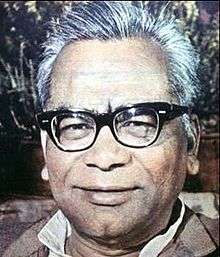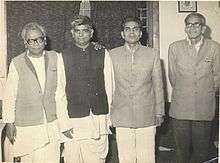Ram Manohar Lohia
| Ram-Manohar Lohia | |
|---|---|
 | |
| Born |
23 March 1910 Akbarpur, Uttar Pradesh, India |
| Died |
12 October 1967 (aged 57) New Delhi, India |
| Nationality | Indian |
| Education | B.A (Calcutta University), Ph.D Frederick William University (today's Humboldt University of Berlin,Germany) |
| Known for | Quit India Movement |
| Website |
www |
Ram Manohar Lohia ![]() pronunciation , (23 March 1910 – 12 October 1967) was an activist for the Indian independence movement and a nationalist political leader.[1]
pronunciation , (23 March 1910 – 12 October 1967) was an activist for the Indian independence movement and a nationalist political leader.[1]
Early life

Ram Manohar Lohia was born on 23 March 1910 at Akbarpur in the present-day Uttar Pradesh, in a prosperous Vaishya family. His mother died in 1912, when he was just two years old, and he was later brought up by his father, who never remarried. He attended the Banaras Hindu University to complete his intermediate course work after standing first in his school's matriculation examinations in 1927. He then joined the Vidyasagar College, under the University of Calcutta and in 1929, earned his B.A. degree.[2] He decided to attend Frederick William University (today's Humboldt University of Berlin, Germany) over all prestigious educational institutes in Britain to convey his dim view of British philosophy. He soon learned German and received financial assistance based on his outstanding academic performance, studying national economy as his major subject as a doctoral student from 1929 to 1933.[3]
Lohia wrote his PhD thesis paper on the topic of Salt Taxation in India,[3] focusing on Gandhi's socio-economic theory.
Major writings in English
- The Caste System: Hyderabad, Navahind [1964] 147 p.
- Foreign Policy: Aligarh, P.C. Dwadash Shreni, [1963?] 381 p.
- Fragments of World Mind: Maitrayani Publishers & Booksellers ; Allahabad [1949] 262 p.
- Fundamentals of a World Mind: ed. by K.S. Karanth. Bombay, Sindhu Publications, [1987] 130 p.
- Guilty Men of India’s Partition: Lohia Samata Vidyalaya Nyas, Publication Dept.,[1970] 103 p.
- India, China, and Northern Frontiers: Hyderabad, Navahind [1963] 272 p.
- Interval During Politics: Hyderabad, Navahind [1965] 197 p.
- Marx, Gandhi and Socialism: Hyderabad, Navahind [1963] 550 p.
- Collected Works of Dr Lohia" A nine volume set edited by veteran Socialist writer Dr Mastram Kapoor in English and published by Anamika Publications, New Delhi.
Selected books on Lohia
- Socialist Thought in India: The Contribution of Ram Manohar Lohia, by M. Arumugam, New Delhi, Sterling (1978)
- Dr. Ram Manohar Lohia, his Life and Philosophy, by Indumati Kelkar. Published for Samajwadi Sahitya Sansthan, Delhi by Anamika Publishers & Distributors (2009) ISBN 978-81-7975-286-9
- Lohia, A Study, by N. C. Mehrotra, Atma Ram (1978)
- Lohia and Parliament, Published by Lok Sabha Secretariat (1991)
- Lohia thru Letters, Published by Roma Mitra (1983)
- Lohia, by Onkar Sharad, Lucknow, Prakashan Kendra (1972)
- Lohia and America Meet, by Harris Woofford, Sindhu (1987)
- Leftism in India: 1917–1947, by Satyabrata Rai Chowdhuri, London and New Delhi, Palgrave Macmillan (2008)
- Lohia Ek Jeevani, by Omprakash Deepak And Arvind Mohan, Published by Wagdevi Prakashan (2006)
Memorials
- Avadh University in Faizabad was renamed as "Dr. Ram Manohar Lohia Avadh University".
- The Dr. Ram Manohar Lohiya National Law University in Lucknow, one of India's top National law schools, is named after him.
- 18 June Road, in Panjim, Goa, is named after him. It was that date in 1946 where he launched an agitation against colonial rule.
- The Willingdon Hospital of New Delhi, was renamed Ram Manohar Lohia Hospital a few decades after independence.
- Dr. Ram Manohar Lohia Institute of Medical Sciences is a medical institute for postgraduate studies in Lucknow.
References
- ↑ http://www.lokniti.org/pdfs_dataunit/publications2010/on_remembering_lohia.pdf
- ↑ Pillai, K Gopinath. Political Philosophy of Rammanohar Lohia: Alternative Development Perceptions Deep & Deep Publications, 1994, p. 68
- 1 2 "Ram Manohar Lohia as a Doctoral Student in Berlin (1929-1933)". The Institute of Asian and African Studies (IAAW). Humboldt University of Berlin. Retrieved 30 March 2015.